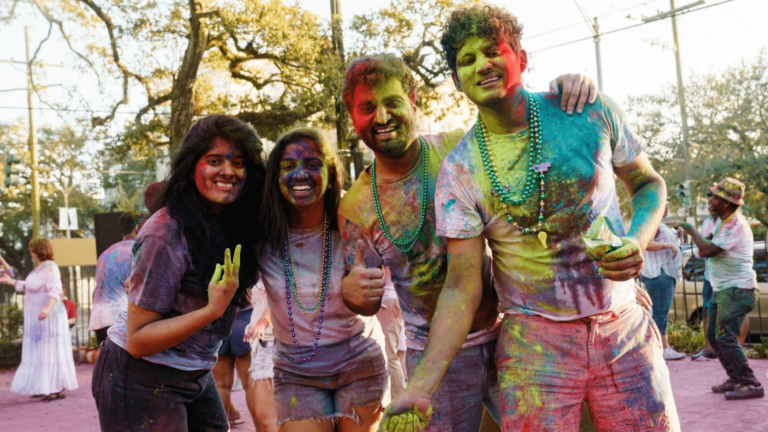If you’re looking for an exciting and rewarding career path, you should check out how to become an event planner. It doesn’t matter what you’re into or what level of experience you’ve got — there are plenty of different ways to crack the industry and get involved.
Event planning is a big umbrella term that includes various career pathways. Each pathway suits people with particular skill sets.
So, which type of event planning would be a great fit for you?
We’ve designed this quick guide to help you find out and walk you through how to pursue an exciting career in event planning. To help you get started, we’ve mapped out six of the most exciting event planning careers by skill set and personality so you can home in on the perfect role.
How do you kickstart a career in event planning?
Before we speed into the various types of careers in event planning, let’s pump the brakes for a minute and talk about what event planning is all about.
Simply put, an event planner is a professional you entrust with creating and coordinating a fantastic event. An event planner could produce an event for a company, charity, sports organization, or anything in between. Likewise, you might hire an event planner to support you with a personal event like a birthday, wedding, or retirement party.
The scope of an event planner’s remit will vary based on the different career pathways we’ll cover.
But generally speaking, an event planner manages most (or all) of the logistics of an event. That includes picking the perfect venue, selecting and managing vendors, organizing catering, event marketing and promotion, public relations, event analytics, and just about everything else you could possibly think of.

Why become an event planner?
There are plenty of reasons you might choose a career in event planning — and one significant reason is that people need event planners.
According to the U.S. Bureau of Labor Statistics, demand for event planning professionals is expected to jump by almost a fifth by 2031. No matter what’s happening with the economy, people will always keep celebrating, getting married, holding meetings, and doing business.
But above all else, event planning is a career worth knowing more about because it’s so gratifying.
As an event planner, you’ll often find yourself responsible for putting together some of the happiest days your clients will ever experience. Beautiful memories are made at weddings, parties, concerts, and festivals. Meanwhile, some of the most influential and positive business links are forged at conferences, meetings, and charity events.
But just as important, as an event planner, you get to exercise every creative bone in your body. You’ll get to come up with a unique vision for an event, and be responsible for executing that vision and turning it into reality.
Do you need a degree to become an event planner?
No, you don’t need a college degree or a certification to become an event planner — but it might help.
Let’s look at the educational options aspiring event planners can choose from when trying to ignite a career in the events space.
Getting a degree
One option is pursuing a bachelor’s degree from a college or university.
There are loads of colleges across the US, Canada, and further afield that offer four-year degrees in event planning, event management, or a related field like hospitality management. You can find courses in these areas at all the big-name schools like NYU, Michigan State, and Arizona State.
The key benefit here is that you’ll get several years to develop a firm foundational knowledge of every aspect of event management. Depending on your course, your curriculum might include real hands-on experience or an internship with an event management company.
Pro tip: If you’re considering the degree route, ask about work experience when visiting campuses. Although you’ll want to develop excellent academic knowledge, you should limit your course search to curriculums that let you try out your skills in real work environments.
Getting an industry certification
Suppose you want to become an event planner without committing four years to your career development. In that case, you can pursue other industry certifications.
Several event industry bodies offer unique certification programs to provide students with a quick (but comprehensive) crash course on how to become an event planner. Many of these courses can be found online and vary in difficulty and time commitment.
Examples of some certifications you might want to explore include:
- Certified Meeting Professional (CMP) certification from the Events Industry Council
- Certified Government Meeting Professional (CGMP) certification from the Society of Government Meeting Professionals
- Certificate in Meeting Management (CMM) from Meeting Professionals International
- Certified Event Planning Specialist (CEPS) certification from the National Career Certification Board
And that’s just a few of them. Before taking on a certification course, do your homework and make sure it covers the skills you want to develop.
Pro tip: Some industry body certifications are very niched. You may want to wait until you’ve done some work experience and have a rough idea of the type of events career you wish to pursue before committing to a particular industry certification.

Getting work experience
You don’t need a degree or a certification to become an excellent event planner — but you will need experience.
Sometimes the best way to get your foot in the door is to apply for jobs with events companies or freelance event planners. These are typically for entry-level positions like administrative assistant, assistant event coordinator, or intern. But you’ve got to start somewhere, right?
Pro tip: Those who don’t ask don’t get! If this route interests you, get in touch with some event planners in your area. You might be able to secure a couple of weeks’ worth of work experience with an event planner to get a taste of what it’s like as a career.
You can even get in touch with event creators through Eventbrite. Take a look at our Creator Spotlights and discover what some of the sector’s top innovators are up to. If you see something that excites you, check out their creator page and hit the “contact” button. We’ll be happy to connect you and get a conversation started.

Networking
Another great way to become an event planner is to dive in and start making contacts. That means meeting vendors, venue managers, potential clients, and even your would-be competitors.
There are many events worldwide explicitly designed for event planners to forge new business relationships. You’ll also find loads of online networking events — many of which are designed for specific types of event planners.
For example, take a look at the First Annual Event Planners Expo by event creator Exclusive Ballroom in Houston. It’s an event designed to bring together event planners, photographers, decorators, sound engineers, and other event professionals to help them forge links and collaborate.
If you’re interested in a particular niche, such as wedding planning, or you intend to conduct business internationally, consider attending events like the Open Afternoon for Wedding and Event Planners organized by the Bury Court Team. The event takes place just outside London and offers wedding planners and other event organizers a valuable opportunity to network and gain inspiration from each other.
Pro tip: If you want to start networking but you’re not confident about approaching people, try starting with an online conference. Sometimes it’s easier to kickstart a live chat, and there is a wide range of online networking events to choose from.
Join an industry body
In addition to networking with potential clients and vendors, it’s also vital that you connect with the big names in your desired field.
You can connect with various professional bodies to network and pursue career development options. These include groups like:
- Wedding International Professionals Association
- National Association for Catering and Events
- Meeting Professionals International
- International Live Events Association
But that’s just the tip of the iceberg. There are lots of industry groups out there, so take a look and find one that matches your desired career trajectory.
Want to learn more about tricks of the trade? Check out some of our webinars.
Run by our team of experts, they cover a range of topics, from how to get started organizing and managing events online to how you can grow your audiences and community.
What are the different types of event planning careers?
Let’s not kid ourselves: There are many different types of event planning careers. After all, some career pathways in event planning are incredibly niched.
To springboard your career search, let’s take a closer look at six of the most popular types of event planners. These insights will provide you with a solid foundation to better understand the various paths you can take in this dynamic and ever-growing industry.
As you might have guessed, the perfect pathway for you depends on your skill set, personality traits, and interests.

General event planner
As a general event planner, you’ll be a jack of all trades. You can work externally with an events company or as a sole trader with your business.
General event planners can be commissioned with events of all shapes and sizes — and they also work with clients and customers on a freelance basis.
One of the most rewarding aspects of working in general event planning is that no two days are the same. One week you might be focusing on putting together a yoga festival, and the following week you’ll be doing a brand launch for a soda company.
You adapt your skills and knowledge to fit the client’s needs, making every event unique and exciting.
Required skill set
- Amazing multitasker
- Highly organized
- Ability to run analytics
- Management experience
- Attention to detail
Required personality traits
- Extroverted
- Assertive
- Creative
Pro tip: If you’re considering this option, the best place to get started is to join a community of event creators like Eventbrite.
By sharing insights and getting pro tips from event planners with a wealth of experience, you can develop a good idea of whether this fits your personality and skill set.

Corporate events planner
A corporate events planner focuses on creating bespoke events for businesses, charities, and other organizations.
Event types can include everything from meetings and retreats to conferences, trade shows, seminars, and more.
Corporate events planners often work internally within big organizations. But more experienced corporate events planners may work externally with a corporate events company or on a freelance basis.
As a corporate events planner, you can take comfort in knowing your work greatly impacts your company’s success. The company’s new venture could crash and burn without the perfect product launch. Without a flawless awards ceremony, employee morale could sink. It’s your job to make your company’s events memorable and successful.
Required skill set
- Communication
- Listening
- Attention to detail
- Data-driven
- Ability to run analytics
Required personality traits
- Logical
- Careful
- Diplomatic
Want to learn more about how to successfully plan and coordinate a corporate event? Take a look at how Eventbrite can help you plan, market and deliver successful business events.

Wedding planner
Wedding planners are experts at doing everything they can to ensure every couple’s big day goes without a hitch.
As a wedding planner, it’s your job to know all the ins and outs of what makes a wedding day special.
That means building and leveraging connections to book the perfect venue and secure the right catering, music, and entertainment for guests. But you’ll also likely get called on to advise on cakes, dresses, tuxedos, photographers, and at least a million other details.
Ultimately, this pathway in event planning can be incredibly rewarding. You have the opportunity to play a pivotal role in creating the most memorable day that two individuals will ever share.
Nothing is more beautiful than the perfect wedding — and by using your skills as a wedding planner, you can make sure each wedding is as unique as the couple walking down the aisle.
Required skill set
- Ability to work well under pressure
- Ability to accept criticism
- Highly organized
- Attention to detail
Required personality traits
- Empathetic
- Patient
- Problem-solving
If you’re considering this area, it’s a good idea to dip your toe into the wonderful world of weddings to see if it’s a right fit.
Check out our community for a range of online wedding events, workshops, and webinars to find out if you’ve got what it takes to make someone’s special day even more magical.

Venue manager
Venue managers focus on organizing and facilitating events within a particular space or collection of spaces.
Venue managers often work with corporate clients to plan events. That being said, venue managers will also spend a lot of time working alongside wedding planners and other event planners.
Ultimately, the types of events you’re working on will depend on the type of space you’re responsible for.
For example, you might operate an industrial space that’s the perfect size for corporate seminars and trade shows. But that same space might attract the attention of quirky weddings and food truck festivals.
That means venue managers must be prepared to deal with anything or anyone and host a wide range of weird and wonderful events.
Required skill set
- Strong leadership skills
- Exceptional communication skills
- Highly organized
- Time management
Required personality traits
- Knowledgeable
- Flexible
- Willingness to compromise
- Passionate
Like it or not, the right venue can absolutely make or break even the most intricately planned event, so getting your venue right is paramount to any event’s success.

Donor coordinator
A donor coordinator is a special breed of event planner.
Donor coordinators usually work for non-profit organizations like charities or trusts. As a donor coordinator, you’ll normally have a range of responsibilities that contribute toward helping to create memorable events. But the most important part of your role is to organize and collect donations.
Huge events rarely happen without sponsorship, and charities rely on donations at big annual and semiannual events to keep doing amazing things for the communities they love. That’s why this is an important and rewarding job.
As a donor coordinator, you can expect to support events like galas, lunches, dinners, parties, and shows. Donor coordinators will often collect donations made at these events in person — but you may also find yourself responsible for managing and coordinating online systems to collect donor pledges.
Required skill set
- Interpersonal skills
- Communication
- Sales
- Relationship building
Required personality traits
- Optimism
- Determination
- Empathy
There are a lot of details to consider and boxes to tick if you want to host an incredible charity gala or a fantastic charity party. But this pathway is possibly one of the most rewarding jobs you could choose.

Catering services manager
Catering services managers focus on providing the perfect food and drinks for event attendees.
Event planners will often subcontract catering services managers for a standalone event or a series of events, so you’ll need to be prepared to work alongside a team of event planners to execute your food vision.
Catering services managers are typically responsible for creating and curating event menus. They’ll then have to manage the food planning, preparation, and execution. That means understanding and applying for the appropriate permits, following strict client instructions, managing a team of chefs and waiting staff, cleaning up, and more.
You might even fill some of these roles as a catering services manager. For example, you might be an executive chef in your own catering business. Or you might be responsible for managing a catering business and waiting tables for your team of cooks.
Why is it worth becoming a catering services manager? People bond over food. According to researchers at the University of Oxford, people feel happier and more satisfied with their lives when eating with others.
So, guests at a wedding might not remember the couple’s first dance — but they’ll definitely remember a unique and delicious meal.
Required skill set
- Chef experience
- Menu design
- Ability to manage cooking staff
- Customer service
- Business management
Required personality traits
- Creativity
- Passionate
- Calm under pressure
- Interest in learning
Ready to learn more about catering for events? We’ve compiled a comprehensive guide to walk you through all the dos and don’ts.
Start your journey to becoming an event planner
Taking that leap and deciding to become an event planner might be the most rewarding career choice you could make. Event planners hold a front-row seat to some of the biggest and most beautiful moments in people’s lives.
But you can become an event planner in many different ways — and the entry point you pursue will depend on the kind of person you are and what your event planning career goals look like.
You could go to college to get a formal education and a degree, get an events industry certification, or simply get out there and start making a name for yourself on the circuit. Either way, there are several different areas you may want to focus on, and each of those areas is ideally suited to particular types of people.
Don’t give up on your dreams, no matter what skill set or personality traits you’ve got. If you really want to become an event planner, wait no longer. There’s a huge demand, and you’ll struggle to find a more rewarding career.
So, are you ready to learn first-hand how to become an event planner? Sign up for Eventbrite now to find out how to start planning, coordinating, and marketing your events.





